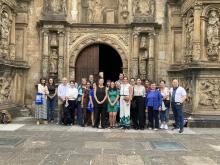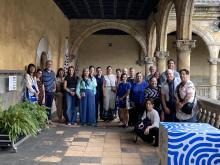Coordinators: Linda Geven (Leiden University, the Netherlands), Celine van Golde (University of Sydney, Australia), Tinneke Van Camp (California State University Fresno, USA ), Gema María Varona Martínez (Director of the Basque Institute of Criminology (University of the Basque Country)
Description of the meeting
The workshop addresses the significant amount of confirmed miscarriages of justice over the past decades. Additionally, exhaustive databases on miscarriages of justice have provided valuable data on the causes and details of wrongful convictions. However, the legal framework for exonerations remains complex, leading to underestimations of wrongful convictions due to a lack of post-conviction relief.
The meeting focuses on the limited attention given to the consequences of exonerations. Wrongfully imprisoned individuals face incomprehensible social, emotional, and economic challenges, which may be further exacerbated after exoneration. Few support services are available for exonerees, and there is a lack of societal understanding of their needs. This is evident in the limited research on how society and legal professionals perceive exonerees and their experiences. These shortcomings also apply to others affected by wrongful convictions, including family members of wrongfully convicted individuals, victims of the crime in which a wrongful conviction took place, defense attorneys, jurors, post-conviction legal support providers etc.
Learning Objectives:
- Gain In-Depth Understanding: Participants will acquire a comprehensive understanding of the alarming numbers of miscarriages of justice, and the emerging or lack of support systems for people affected by wrongful convictions in various countries.
- Analyze Legal Frameworks: The meeting will encourage participants to analyze and compare the complexities of legal frameworks, in both adversarial and inquisitorial criminal justice systems, for exonerations. Participants will discuss potential reforms and improvements.
- Examine Consequences of Exonerations: Experts will explore the far-reaching consequences of wrongful convictions and how they affect exonerees’ social, emotional, and economic well-being, particularly after exoneration, as well as consequences and support needs for their social network.
- Identify Gaps in Support: The meeting will highlight the stigma associated with exoneration and the lack of societal understanding regarding the needs of exonerees.
- Promote Research and Knowledge Exchange: Participants will be encouraged to discuss the need for further research on experiences in the wake of wrongful convictions and exonerations, and how society and legal professionals perceive and respond to their needs.
- Foster Collaborative Solutions: The meeting aims to facilitate collaboration among legal decision-makers, psychologists, criminologists, and society to improve the overall experience of exonerees and address the challenges they face post-exoneration in specific working groups.
- Develop Best Practices: Experts will work together to identify and formulate best practices for supporting exonerees and others affected and mitigating the adverse effects of wrongful convictions, both during and after exoneration.
Our experience in Oñati
In addition to exploring the vocabulary of 'wrongful convictions' and their consequences, and an in-depth discussion of the many harms they cause (which can continue long after exoneration), a fundamental value of this workshop has been the observations made about the differences in how wrongful convictions come about in different legal systems. Notwithstanding the diverse legal strategies related to the review of convictions and the complaint and compensation systems, we found common socio-cultural aspects that can be drawn on to develop support systems. For example, reference was made to the pressures of the system itself in its day-to-day organisation; to the professional culture of prosecutors, judges and lawyers in relation to the presumption of innocence and the construction of judicial truth; to the many obstacles to get convictions reviewed and overturned; to the 'dark figure' issue in counting occurrences of unjust prosecutions and convictions; to the influence of social views of exonerees and of ‘ideal victims and offenders’ associated with existing discrimination in society itself; to the role of the media and pressure groups to support people who were wrongly accused or wrongly convicted; to the lack of consideration for others affected (e.g., relatives of wrongfully convicted persons, the original victim of a crime in which a wrongful conviction took place); to the vicarious harm experienced by legal professionals and law students working on post-conviction procedures; to the limited resources available to support people affected; to the impact on society's trust in the administration of justice; to the system's inertia, observed in preservation and overreliance on procedures (such as plea bargaining) that cause individual, family, community, social and organisational harm; and to the importance of accountability for these injustices in order to prompt effective system change.


